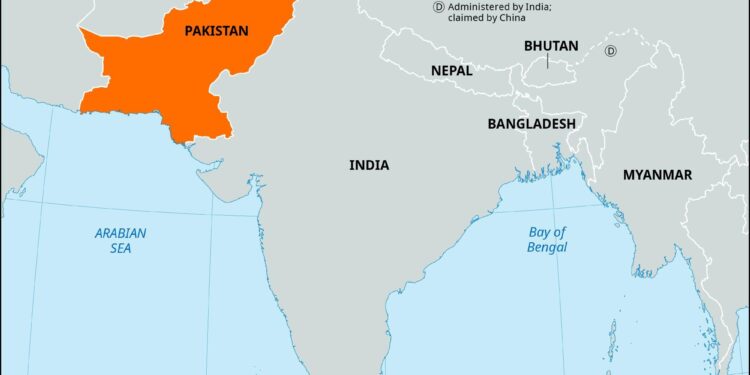In a significant diplomatic maneuver aimed at bolstering regional security and economic ties, Pakistan, China, and Afghanistan have announced a united front to combat militancy across their borders. This collaborative effort, revealed during a recent summit, not only prioritizes the stabilization of Pakistan and Afghanistan but also seeks to extend the ambitious China-Pakistan Economic Corridor (CPEC) into Kabul. The agreement highlights the growing interdependence among the three nations and underscores a collective commitment to fostering peace while enhancing trade routes critical to regional development. As the threat of militancy continues to loom large, the trilateral partnership could pave the way for a new chapter in regional cooperation, with significant implications for security and economic progress in South Asia.
Pakistan, China, Afghanistan Unite in Anti-Militancy Pact to Ensure Regional Security
In a significant geopolitical development, Pakistan, China, and Afghanistan have solidified their commitment to combat militancy collectively, seeking to enhance regional security. This pact comes in response to the rising threat of extremist groups that jeopardize peace and stability across their shared borders. The leaders of the three nations convened to outline a framework that emphasizes collaborative intelligence sharing, joint military exercises, and coordinated counter-terrorism strategies. Critical components of the agreement include:
- Strengthened Intelligence Sharing: Establishing secure communication channels for real-time information exchange.
- Joint Military Exercises: Regularly scheduled training sessions to enhance the operational capabilities of their armed forces.
- Coordinated Counter-Terrorism Operations: Collaborative efforts to neutralize threats across regional hotspots.
Additionally, an ambitious plan to extend the China-Pakistan Economic Corridor (CPEC) to Kabul has been proposed, aiming to bolster economic ties and infrastructure development in Afghanistan. This expansion seeks to connect key trade routes and facilitate regional commerce, which in turn will contribute to stability by providing economic opportunities. As part of this strategic initiative, a recent meeting highlighted several pivotal projects:
| Project | Description | Timeline |
|---|---|---|
| Road Connectivity | Improving road infrastructure between Pakistan and Afghanistan | 2024-2026 |
| Energy Projects | Joint investments in energy generation and distribution | 2023-2025 |
| Trade Facilitation | Establishing customs cooperation to enhance trade | 2023-2024 |
Strategic Expansion of CPEC to Kabul Aims to Boost Economic Cooperation and Stability
The recent commitment by Pakistan, China, and Afghanistan to enhance economic collaboration through the extension of the China-Pakistan Economic Corridor (CPEC) to Kabul marks a significant leap towards regional stability. By integrating Afghanistan into this ambitious infrastructure initiative, the three nations aim to bolster trade routes and create economic opportunities that could alleviate poverty and enhance living standards. The potential benefits of this expansion include:
- Increased Trade: Expanding CPEC to Kabul could facilitate smoother trade relations among the three countries, fostering a more interconnected regional market.
- Investment Opportunities: The initiative is expected to attract investments in various sectors such as energy, transportation, and telecommunications.
- Job Creation: New projects and infrastructures can generate employment, thereby reducing unemployment rates in Afghanistan and fostering economic growth.
Furthermore, the strategic extension aligns with the trilateral agreement to combat militancy, emphasizing shared security interests. By promoting economic interdependence, this venture intends to create an environment of stability, diminishing the appeal of extremist ideologies. The participating nations are set to explore collaborative measures, including:
| Collaboration Areas | Objectives |
|---|---|
| Infrastructure Development | Enhance connectivity and transportation links. |
| Counter-Terrorism | Coordinate efforts to address security challenges. |
| Economic Initiatives | Launch projects to drive regional trade and investment. |
Recommendations for Strengthening trilateral Relations to Combat Terrorism and Enhance Trade
To enhance cooperation among Pakistan, China, and Afghanistan in the fight against terrorism and to facilitate trade, a multi-faceted approach is essential. Key strategies should include:
- Intelligence Sharing: Establishing a robust framework for real-time intelligence exchange to preemptively address threats.
- Joint Military Training: Conducting joint exercises to improve operational readiness and capacity among the security forces of the three nations.
- Regional Collaboration: Hosting regular trilateral summits to foster dialogue and cooperation on security strategies and trade agreements.
Furthermore, enhancing the China-Pakistan Economic Corridor (CPEC) to include Afghanistan could serve as a catalyst for economic integration and stability in the region. Proposed initiatives might incorporate:
- Infrastructure Development: Investing in critical infrastructure that connects Afghan markets with both Pakistan and China.
- Trade Incentives: Introducing incentives for businesses that engage in cross-border trade, fostering a more interconnected economy.
- Cultural Exchange Programs: Promoting mutual understanding through initiatives that encourage cultural and educational exchanges between the three countries.
To Wrap It Up
In conclusion, the recent trilateral agreement between Pakistan, China, and Afghanistan marks a significant step towards enhancing regional stability and countering militancy. By committing to a joint security framework and the extension of the China-Pakistan Economic Corridor (CPEC) to Kabul, the three nations aim to foster economic cooperation and mitigate the threats posed by extremist groups. As these partnerships develop, it remains crucial for international observers to monitor the implications for geopolitical dynamics in South Asia and the overarching impact on regional security. The effective implementation of this accord will not only shape the future of Afghanistan but could also redefine the balance of power within the region, making it an essential development to watch in the coming months.














